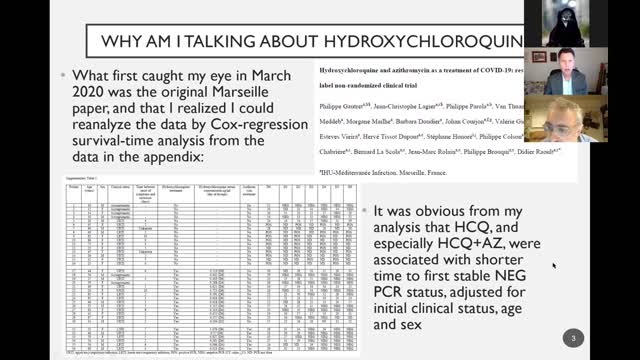Premium Only Content

Dr. Harvey Risch's presentation at the C19 minisymposium session, November 7 2021
Hydroxychloroquine and Other Outpatient Treatments for Covid-19, with Critique of Epidemiologic Methods
Abstract: To most academics and clinicians, the field of epidemiology seems like a no-brainer--you just get some cases and controls, run some regression models if you are a quant, and see what's different. Is there really any science there? Epidemiology is indeed a science but what is scientific about it per se is subtle. The crucial scientific aspect about epidemiology is representativeness: that the patients are generalizable to the disease as a whole, the controls are generalizable to the population of relevance, the exposure measures accurately reflect what the subjects really experienced, and the exposure association is not reflective of some other reason why an association is present. Epidemiologists agonize over these issues in terms of bias and confounding, as well as misrepresentation of studies, cherry picking and other more general corruptions of the scientific method. In this talk, I will discuss how non-scientific factors created aberration of knowledge greater than the scientific evidence itself, and show what the evidence for early treatment really does show.
References:
H.A. Risch. "Early Outpatient Treatment of Symptomatic, High-Risk Covid-19 Patients that Should be Ramped-Up Immediately as Key to the Pandemic Crisis", American Journal of Epidemiology 189 (2020), 1218-1226
https://doi.org/10.1093/aje/kwaa093
H.A. Risch. "Hydroxychloroquine in Early Treatment of High-Risk COVID-19 Outpatients: Efficacy and Safety Evidence." Sixth version, updated June 17, 2021.
https://earlycovidcare.org/wp-content/uploads/2021/09/Evidence-Brief-Risch-v6.pdf
Presented at the "Efficacy and safety statistics of COVID-19 treatment and prophylaxis protocols" minisymposium session at the 4th Annual Meeting of the SIAM Texas-Louisiana Section on November 7, 2021. This presentation does not necessarily represent the opinions or policies of the presenter's institution or SIAM, but it is protected under Academic Freedom in Research and the 1st Amendment of the United States Constitution.
-
 1:51:29
1:51:29
Eleftherios Gkioulekas -- Research and Commentary
1 year agoCritical appraisal of multi-drug therapy in the ambulatory management of hypoxemic COVID-19 patients
112 -
 1:06:26
1:06:26
TheCrucible
3 hours agoThe Extravaganza! EP: 28 (8/27/25)
91.5K3 -
 1:30:22
1:30:22
Kim Iversen
4 hours agoNetanyahu Says Armenian Genocide Was Real — But Gaza Deaths Are A “Mishap"
40.1K97 -
 1:08:47
1:08:47
vivafrei
3 hours agoAnother "Trans" Mass Shooter? Rampage Jackson Keeps Digging? Democrats are Just Awful AND MORE!
33.2K42 -
 LIVE
LIVE
The Mel K Show
1 hour agoLive Q&A with Mel K 8-27-25
488 watching -
 LIVE
LIVE
Quite Frankly
6 hours ago"Planet Chaos, Life on Mars, Open Lines" ft. Oppenheimer Ranch Project 8/27/25
611 watching -
 LIVE
LIVE
The Mike Schwartz Show
7 hours agoTHE MIKE SCHWARTZ SHOW Evening Edition 08-27-2025
3,894 watching -
 1:34:24
1:34:24
Redacted News
4 hours agoLIVE: Minnesota School Shooter’s Shocking Motive Revealed – Plus Trump Targets Soros w AG Ken Paxton
140K145 -
 4:55:15
4:55:15
StoneMountain64
7 hours agoHUNTING FOR THE FIRST WIN BACK ON WARZONE
70.2K2 -
 1:09:06
1:09:06
The Officer Tatum
4 hours agoBREAKING: Shooter IDENTIFIED TR*NS , Cracker Barrel CAVES To Pressure + MORE | EP 162
49.1K83